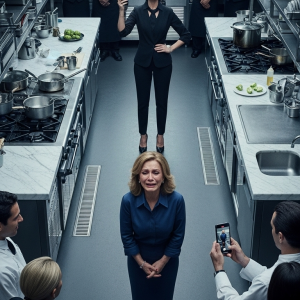The air in the small living room was thick with a sour tension that clung to the back of my throat. It was the smell of broken dreams and bad decisions. My son, Daniel, stood before me, his shoulders slumped, his eyes refusing to meet mine. He was a ghost in his own home.
Beside him, his wife Jessica was a vibrant flame of defiance. Her arms were crossed, her chin held high, and a smirk played on her lips as she watched the final scene of her little drama unfold. She was the director, and I was the character being written out of the script.
“We just can’t do it, Mom,” Daniel mumbled, his voice barely a whisper. He was staring at a spot on the worn floral wallpaper just over my shoulder. “With the new business loan… the bank needs to see the house as a clear asset. They said there can’t be any… complications.“
“Complications?” I repeated, my voice hoarse. “I am a complication? Daniel, I have lived in this house for forty years. I raised you in this room. Your father passed away on that couch. This isn’t just an asset; it’s our life.“
“It’s our life now,” Jessica chimed in, her voice as sharp and sweet as broken candy. “We need to think about our future, Eleanor. Daniel’s new online marketing venture is going to be huge. We can’t let old attachments hold us back.“
The “venture” was a get-rich-quick scheme involving imported electronics that I knew, with the certainty of my sixty-five years, would fail. I had warned them against using the house—the only thing his father had left us—as collateral. That warning had sealed my fate.
“So that’s it?” I asked, looking at my son, pleading with my eyes. “You’re throwing me out of my own home for a gamble?“
He finally looked at me, and what I saw in his eyes broke what was left of my heart. It wasn’t anger. It was a terrifying emptiness. He was already gone, lost to the ambitions of the woman standing beside him.
“Jessica thinks it’s for the best,” he said, as if that explained everything.
Jessica stepped forward and thrust a black trash bag into my hands. It was flimsy and thin. “Just the essentials for now, Eleanor. We’ll deal with the rest of your things later.” Her smile never wavered. It was the smile of a victor.
My hands were numb as I walked back to my small bedroom. What were the “essentials” of a sixty-five-year life? I packed a few faded photographs, my husband’s old watch, a change of clothes, and my worn recipe book. The entire contents of my world fit into a single, flimsy trash bag.
When I returned to the living room, Daniel was holding out a crumpled wad of cash. He wouldn’t look at me. “Here,” he said. “This should help you get started.“
I unfolded the bills. A ten and two ones. Twelve dollars. The price of forty years of motherhood. The cost of a lifetime of devotion.
I didn’t take the money. I just looked at my son. “I hope it’s worth it, Daniel,” I whispered.
Jessica opened the front door, a grand gesture of dismissal. “We wish you all the best, Eleanor,” she said brightly. The door clicked shut behind me, the sound echoing with a horrifying finality. I stood on the sidewalk under the pale streetlights, holding a trash bag, with the entire net worth of my past life amounting to the twelve dollars my son had tried to press into my hand.
The first night was a blur of cold and shame. I couldn’t bring myself to call any of my old friends. How could I explain that my own son had made me homeless? The humiliation was a physical weight, pressing down on my chest, making it hard to breathe.
I walked for hours, the trash bag rustling against my leg like a constant, mocking reminder. Eventually, I found myself at the city bus station. It was dimly lit and smelled of disinfectant and despair, but it was open all night. I found a hard plastic bench in a corner and sat down, pulling my thin coat tighter around me.
Sleep was impossible. Every time I closed my eyes, I saw Jessica’s triumphant smirk and the hollow emptiness in Daniel’s gaze. I saw the front door of my life closing forever. Around me, the city’s forgotten souls drifted in and out—people whose stories I didn’t know, but whose exhaustion I suddenly understood perfectly.
In the deepest, darkest hour before dawn, a woman with kind, weary eyes and a volunteer’s vest sat down beside me. She held out a thermos. “Coffee?” she asked softly. Her name was Grace, and she worked the overnight shift at a local shelter.
I shook my head, unable to speak past the lump in my throat. She didn’t press. She just sat with me in the quiet, a small act of solidarity that felt like a lifeline. “The sun will come up,” she said, before getting up to leave. “It always does. The trick is to be ready to stand up when it does.“
Her words stayed with me. As the first gray light of dawn filtered through the grimy windows of the bus station, I made a promise to myself. I would not be broken. I had twelve dollars, a bag of memories, and a book of recipes. It would have to be enough.
My first stop was a pawn shop. I sold my husband’s gold watch. The man behind the counter gave me two hundred dollars for an item that held a universe of memories. I didn’t flinch. Memories wouldn’t buy me a meal.
With that money, I rented the cheapest room I could find, a tiny, stuffy space above a noisy bar. The lock on the door was flimsy, and the single window looked out onto a brick wall, but it was mine. It was safety.
The next day, I started looking for work. No one wanted to hire a sixty-five-year-old woman with no recent work history. After a week of rejections, I swallowed my pride and walked into a greasy-spoon diner, the kind of place with cracked vinyl booths and the lingering smell of old coffee.
“I can’t pay much,” the gruff owner, a man named Sal, said after I told him I could cook. “You wash dishes, you do prep work. Fifty dollars a shift, under the table.“
“I’ll take it,” I said without hesitation.
The work was grueling. I was on my feet for ten hours a day, my hands raw from hot water and cleaning chemicals. But in that chaotic, steaming kitchen, I found a strange kind of peace. I poured my grief and anger into dicing onions, into kneading dough, into scrubbing pots until they gleamed.
Sal noticed. He saw the way I handled the food, the care I took even with the simplest tasks. One day, the regular cook called in sick. “Maria,” Sal barked. “You’re on the grill.“
That day, something shifted. The lunch rush was a blur, but I moved with an instinct I had forgotten I possessed. I seasoned the burgers perfectly, made the soup from scratch using a recipe from my book, and even baked a small batch of my signature lemon-rosemary cookies.
The customers noticed. A regular told Sal it was the best meal he’d ever had there. By the end of the day, Sal grunted, pushed an extra twenty-dollar bill into my hand, and said, “You’re on the grill from now on.“
For two years, I worked at that diner. I saved every single dollar I could, living a spartan life in my tiny room. I never heard a word from Daniel. It was as if I had ceased to exist. The pain of that silence was sharp, but it was also clarifying. I was truly, completely on my own.
One afternoon, on my day off, I was walking through a rundown part of town when I saw it: a small, forgotten storefront, its windows clouded with dust, a “For Rent” sign hanging crookedly in the door. It was tiny, barely bigger than my old living room.
But in my mind’s eye, I didn’t see the grime and decay. I saw a small, clean counter. I saw a display case filled with fresh pastries. I saw a few small tables where people could sit and enjoy a cup of good coffee. I saw a new beginning.
It took every penny of the five thousand dollars I had painstakingly saved, but a month later, “Maria’s Table” was born. It wasn’t much—just a counter, an old oven I’d bought secondhand, and three small tables. I worked from before sunrise until long after sunset.
At first, only a few curious neighbors stopped by. But the word began to spread. The quality of my baking, the richness of my soups, the warmth of my welcome—it was all authentic. It was all real. People came for the food, but they returned for the feeling of being cared for, of being welcomed at my table.
The next ten years were a blur of hard work and steady growth. “Maria’s Table” became a beloved local institution. I hired my first employee, then another. We expanded into the vacant storefront next door. The little bakery grew into a bustling café, then a full-fledged, highly-rated restaurant.
I never took out a loan. I built my business the same way I had rebuilt my life: one dollar, one brick, one success at a time. I became known in the local business community as a savvy, no-nonsense operator. The quiet, dismissed mother had become a respected entrepreneur.
I heard whispers about Daniel and Jessica through the grapevine. A friend of a friend mentioned their “online marketing venture” had failed spectacularly within a year. They had lost the house. There were rumors of bankruptcy, of them moving to a smaller, cheaper town to escape their debts. I felt a distant, hollow ache when I heard it, but I did not reach out. They had closed that door, not me.
On my seventy-fifth birthday, my accountant showed me my net worth. I looked at the number, stunned. It was more money than I had ever imagined. That afternoon, I went for a drive and saw a house for sale in the city’s most beautiful historic district. It was a magnificent stone house with a sprawling garden and a kitchen that looked like it belonged in a magazine.
I bought it with cash the next day.
The house wasn’t a statement of wealth. It was a fortress of peace. A testament to the fact that I had not only survived, but thrived. I filled its sunlit rooms with art, books, and the laughter of the new family I had built—my friends, my loyal staff, and Grace from the shelter, who had become one of my dearest companions. It was a life of quiet, earned joy.
Twenty years. Two decades of silence. In twenty years, the raw wound of my son’s betrayal had faded into a pale, thin scar. I rarely thought of him. My life was full. My heart was at peace.
Then, one rainy Tuesday afternoon, the phone rang. It was an unknown number, but something made me answer it.
“Hello?”
A man’s voice, hesitant and rough, crackled on the other end. “…Mom?”
Time stopped. I would have known that voice anywhere, even though it was now strained with a weariness I had never heard before. It was Daniel.
“Yes,” I said, my own voice a stranger to my ears.
He took a shaky breath. “Mom… I… we need help. We’re in trouble. Jessica and I… we have nowhere to go. Can… can we come see you? Please?”
I looked around my beautiful, sun-drenched living room, at the orchids blooming on the windowsill and the photos of my travels on the mantel. And I thought of the cold plastic bench in the bus station.
“I’ll text you the address,” I said, and hung up.
They arrived the next day, pulling up in a rusty, dented sedan that coughed and sputtered at the curb. They looked like ghosts from another life.
Daniel was thin, his hair graying at the temples, his face etched with the deep lines of failure and chronic stress. He wore a cheap suit that hung loosely on his frame.
Jessica was almost unrecognizable. The vibrant, confident flame had been extinguished. Her expensive clothes were gone, replaced by worn-out jeans and a faded t-shirt. Her face was pale and drawn, her eyes darting around my property with a mixture of awe and bitter resentment.
I met them at the door but didn’t invite them in. Not yet. I led them to the stone patio in my garden, where a table was set with iced tea and a plate of the lemon-rosemary cookies that had started it all.
They sat down, looking small and out of place amidst the blooming roses.
For a long moment, no one spoke. Then Daniel broke, the words tumbling out in a desperate, broken rush. The second business failed. Then the third. They had been living on credit cards for years, moving from town to town, one step ahead of their creditors. They had lost everything. They were being evicted from their small apartment at the end of the week.
“We have nowhere to go, Mom,” he finished, his voice cracking. He was openly weeping now. “We’ll sleep in the car. Please. Just for a little while. Until we can get back on our feet.”
Jessica, for her part, tried to muster a tearful apology. “Eleanor, I was young and foolish,” she sniffed. “I was so wrong. I’ve regretted what we did every single day.” Her performance was good, but I could see the calculation in her eyes as she took in the expensive stonework and landscaped gardens. She wasn’t sorry for what she did; she was sorry it hadn’t worked out for her.
I let the silence hang in the air. I let them sit in the weight of their request. Then, I finally spoke.
“I remember a night, twenty years ago,” I said, my voice calm and clear. “I was sitting on a plastic bench at a bus station. I was terrified. I was sixty-five years old and all I had in the world was a trash bag and the clothes on my back. I thought my life was over.”
I looked at Daniel. “You did that to me. You watched the woman who raised you, who loved you, walk out into the night with nothing, and you closed the door.”
I turned to Jessica. “And you smiled. You thought you had won. You had your house, your future, free of the ‘complication’ of an old woman.”
I stood up and walked to the edge of my garden, looking out at the beautiful world I had built for myself.
“I did not get here by magic,” I said, turning back to face them. “I got here with ten-hour shifts in a hot kitchen, with years of saving every dollar, with sleepless nights worrying about my own business. This house, this garden, this peace—I earned it. It was forged in the fire you threw me into.”
I walked back to the table and took a checkbook out of my apron pocket. I wrote out a check and slid it across the table.
“This is for two thousand dollars,” I said. “It is enough for a security deposit and first month’s rent on a modest apartment. I have also written down the number of an excellent financial counselor and a job placement agency. They can help you get back on your feet.”
Daniel stared at the check, his eyes wide. Jessica looked from the check to my face, a flicker of hope and greed in her eyes. “So… we can stay?” she asked, her voice trembling. “Just for a little while?”
And then, I delivered my final action. The one that had been twenty years in the making.
“No,” I said, my voice gentle but as unyielding as the stone of my house. “I will not let you sleep on the street. But I will never, ever let you set foot in my home again. This check is charity. It is not family. The family you and I had ended the night you closed that door.”
The hope in their eyes died, replaced by a stunned, stark silence. They finally understood. I was not offering them a lifeline back to their old life. I was giving them exactly what they had given me all those years ago: a handful of cash and a closed door. It was just that my door was made of self-respect, and it was one they could never unlock.
They left without another word, the crumpled check in Daniel’s hand. I watched them go, and for the first time, I felt no pain. No anger. Only a quiet, unburdened peace. I had balanced the books, and I was finally free.




